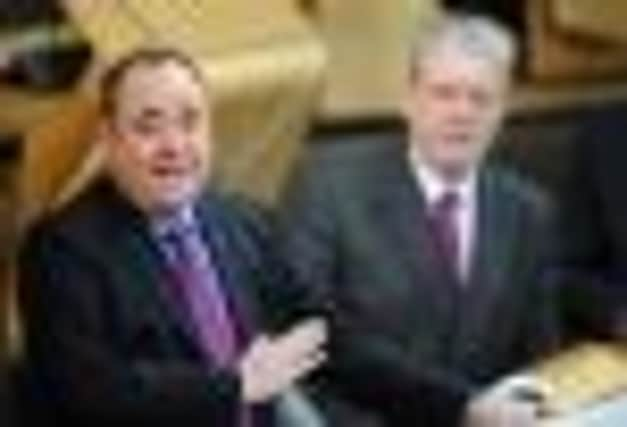Alex Massie: McCluskey press report is bad news


The “expert panel” Alex Salmond asked to produce a Scottish answer to the supposed problem of press regulation has published a document that is by turns confused, heavy-handed, super-statist, inimical to freedom and, in the end, farcical. It is a farrago of wishful thinking, hopeless naiveté and predictable ignorance. In short, I am unimpressed. I hope the First Minister regrets empowering this panel; if he is wise he will ignore its recommendations.
How many times must it be reiterated that the sensible response to law-breaking is law-enforcement, not necessarily the passage of new laws? This seems beyond the wit or ken of parliamentarians north or south of the Border. Meanwhile, the McCluskey panel boldly wrestles with the tiniest of straw men. “No one” it suggests in its typically sanctimonious style, “is above the law”. No one, actually, has suggested that journalists should be.
Advertisement
Hide AdAdvertisement
Hide AdFor those keeping score, 116 people have been arrested in connection with phone-hacking investigations. That total will continue to rise. If newspapers have sometimes acted deplorably, it is no longer possible to maintain they are not suffering for their past actions. The mills of justice may grind slowly but they grind remorselessly. Offences – such as phone-hacking – that once merited a small fine are now punishable by years in prison. As you might expect, this has concentrated minds.
In these circumstances, new laws further restricting press freedoms cannot credibly be thought a proper or proportional response to a problem that, however belatedly, is being addressed. Leveson and McCluskey are already out of date. They are solutions in search of a problem.
The supporters of state-sponsored – sorry, “state-underpinned” – regulation seem breezily confident their proposals would be the end of the matter. Leveson and McCluskey each seem utterly blind to the idea, far less the well-established reality, of regulatory creep. Similarly, they blithely argue that because other professions are heavily regulated it is unreasonable to make an exception for the press.
But there is every difference between rules for government-paid employees, such as judges, and regulating private parties in the media. Similarly, professional bodies such as the General Medical Council regulate their professions as a means of insisting upon certain minimum standards. They are gate-keepers protecting their own interests, not necessarily those of the general public.
The press is different. It is, in any case, a trade not a profession. There are no minimum standards for entry. This is a good thing. Leveson, sensing that technological changes to the industry complicated his brief, simply avoided questions about the internet. The McCluskey panel is not so feart. Everyone and anyone publishing anything anywhere online should be subject to Scottish “press regulation”.
The report is clear on this. All “news-related material” including “comment” and “gossip” falls within the regulatory purview. As Scottish case law has viewed “publication” to mean where an item was downloaded or viewed this would seem to extend the regulator’s remit to cover, for example, an expatriate blogger writing about Scottish affairs or, for that matter, any foreign publication which can be viewed online from Scotland. Good luck enforcing that.
Advocates of press regulation are quick to look overseas for international examples that bolster their case. But the only international comparison worth a damn is the protections afforded the press by the First Amendment to the Constitution of the USA. No American newspaper could or would accept signing up to Leveson’s proposals, far less the compulsory regime suggested by McCluskey.
Leveson and the McCluskey panel each insist their recommendations do not grant significant regulatory powers to the state. They appear to think no one will trouble themselves to read the detail of their proposals. McCluskey’s draft bill, for instance, establishes a “Recognition Commissioner” who will be appointed by ministers. The Recognition Commissioner will be tasked with ensuring the “independent” body regulating the press fulfils its remit.
Advertisement
Hide AdAdvertisement
Hide AdThis state-appointed official “may withdraw recognition as the approved regulator” if the Commissioner is satisfied that “the body is not meeting the approval requirements”. In those circumstances, “Scottish ministers must constitute a body to fulfil the functions of approved regulator and submit that body for recognition by the Recognition Commissioner.” In other words, the “independent” regulatory body must satisfy a government-appointed commissioner or risk being replaced by a wholly state-appointed regulatory regime. The regulator’s independence is so severely compromised that you need not own a tinfoil hat to think this is, implicitly, state-regulation in all but name.
This is not simply a question of journalistic special-pleading. Organisations such as Index on Censorship also worry where this mania for taming the press will lead. Editors are now routinely badgered by politicians demanding they pull articles that offend MPs or MSPs. The threat of sanctions is not implicit, it has become explicit.
As prosecutions based on nothing more than tweets or Facebook status updates demonstrate, freedom of expression is already being curtailed in this country. Leveson and his little brother McCluskey would exacerbate this worrying trend. Of course politicians favour clipping press wings. That alone should persuade you these recommendations are as deplorable as they are dangerous. «
Twitter: @alexmassie